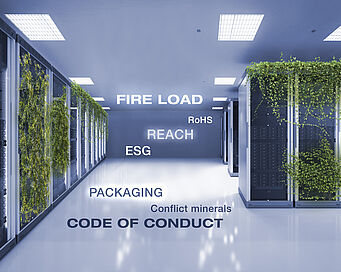The data center landscape is changing, capacity is in demand. The resilience and redundancy of data centers is becoming increasingly an issue and is also very important in the service sector. In addition to the existing requirements and the growth of data centers there are now further requirements in the field of environmental social governance. We have invited Nicole Bittlingmayer from the Luther lawfirm who is an expert for this topic.
Nicole Bittlingmayer: I am not an IT expert, but come from the capital market practice. I advise regulated financial companies with regard to their ESG strategy, i.e. compliance of their processes and their products with the sustainable finance regulation. This includes the Disclosure Regulation, the CSAD, and the taxonomy. So it's a massive amount of regulation that is still being subject to consultations and that is evolving.
And of course products like data centers are very interesting, also for investors who are paying increased attention to ESG issues and aligning their investments and investment processes to ensure ESG compliance. And so, of course, data centers are also a very interesting asset class. However, data centers are somewhat challenging from an ESG point of view. Here we go again, sustainability against resilience etc. That doesn't really fit yet.
Till from SFS RE, another voice on these requirements. It would be interesting to know which aspects play a role in the infrastructure from your perspective.
Till Ruda: I would like to take over Nicole's part, although I'm not a lawyer. I'm looking at the whole thing a bit more from the boring financial perspective that I actually come from. At the same time, however, I look at it from the area of real estate and infrastructure investments. The exciting thing about the whole issue of sustainability is that capital market participants have already begun to feel insecure. However, this insecurity isn't felt by the sub-suppliers, yet. This can now be the person who repairs the roof of a data center and then will be asked: What is the impact of your work and the materials that you use in terms of carbon footprint? This question comes from the current regulation, the ESRS and the Scope regulation. ESRS means European Sustainable Regulation Standard. This regulation results in new issues or challenges that have to be dealt with now. At the same time, many people still don't know much about this topic. This is not at all irrelevant, because it can lead to a situation where large clients who are listed on stock exchanges are no longer in a position, or are no longer allowed, to commission such subcontractors. For example, your customers.
Nicole Bittlingmayer: And at this point I would like to take a closer look at the topic of insecurity. Indeed, the whole regulation is still in the works. There are constant consultations to look again at whether the objectives have been achieved or whether we need to make improvements? This question is also an extremely difficult one for market participants. That's where this huge debate about greenwashing comes from...
Matthias Reidans: …and greenbleaching,
Nicole Bittlingmayer: ...and greenbleaching. Maybe I should briefly explain the term greenwashing. What is greenwashing? If you can't define exactly what is actually green. Greenwashing is of course an extreme liability risk. Therefore, it is a great field of activity for lawyers. It has actually led to the emergence of a new term in the financial market, namely greenbleaching. This term means that you are actually convinced that you are green with your investment processes and your products. But you categorise your products a little worse, so to speak. You do downgrading, greenbleaching, because you are afraid of liability. And that is of course not a good development for the ESG transformation process. However, it is understandable that companies pay attention to liability issues.
Till Ruda: Let's talk briefly about greenwashing. This is precisely the big problem. These regulations are new and not everyone has seen the need to deal with them until now
and wrongly believes "Well, we are already sustainable". It can be the family-run business that says we donate to the football club, we have a bee meadow in the back,
our employees are doing well. From an ESG perspective, this is all very, very, very good. Our employees are doing well. Yes, but not necessarily enough. And if you then proclaim on your website - and this is precisely the issue - that you are very sustainable, then the issue becomes a real risk. And that's where you should consult experts at the latest to help you, as strategy advisors, but later hopefully also in implementation, to make sure that your ESG measures really work. These are relatively complex issues that have to do with accounting, where you need lawyers who read your texts. That's more or less what it's all about.
You can find more information about sustainability in the data center here.


